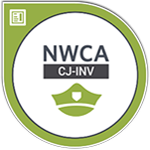PURPOSE
The Criminal Investigation credential documents the fundamental competencies for the criminal justice professional involved in investigating alleged or suspected criminal violations of Federal, state, and local laws to determine if evidence is sufficient to recommend prosecution.
AUDIENCE
This credential is appropriate for criminal justice professionals including special agents, detectives, investigators, criminal investigators, police detectives, narcotics detectives, fire inspectors and investigators, correctional officers, sheriffs and deputy sheriffs, airfield operations specialists, social and human service professionals, and others involved in crime investigation. Though each position uses unique and specialized techniques and knowledge to investigate their respective types of crimes, this exam covers the fundamentals information.
JOB/CAREER REQUIREMENTS
Credentials in Criminal Investigation verifies competencies required for entry level workers involved in criminal investigation beginning with analyzing allegation reports to determine the evidence needed and direction investigation should take through crime scene investigation ending with writing reports of findings and testifying before grand juries and courts about investigation findings. Effective investigative professionals must have excellent problem solving skills, excellent communication skills, and skills of observation and deduction. They must be able to use technical tools and equipment including computer software, create accurate documentation and reports, apply criminal intelligence methods, and apply appropriate criminology theories in the investigation process. Successful criminal investigators have a thorough knowledge of the law, government, the court process, criminal offender and victim rights, and methods used by criminals. Areas of investigation include crimes against people, crime
CRIMINAL INVESTIGATION WORKPLACE TASKS:
- Investigate organized crime, public corruption, financial crime, copyright infringement, civil rights violations, bank robbery, extortion, kidnapping, and other violations of federal and state statutes
- Identify case issues and evidence needed, based on analysis of charges, complaints, or allegations of law violations
- Determine scope, timing, and direction of investigations
- Obtain and verify evidence using interview and observation techniques with suspects and witnesses
- Obtain and verify evidence by analyzing records
- Search for and collect evidence, such as fingerprints, using investigative equipment
- Collect and record physical information about arrested suspects, including fingerprints, height and weight measurements, and photographs
- Use tools and equipment including handcuffs, handguns, computers, surveillance video, audio recorders, two-way radios, database software, email, graphics and photo imaging software, and map creation software
- Record evidence and documents using equipment such as cameras and photocopy machines
- Obtain and use search and arrest warrants
- Testify before grand juries concerning criminal activity investigations
- Apply knowledge of law, government, public safety, security, and psychology in investigating criminal behavior
- Apply effective communication and active listening skills
- Write clearly and comprehensively to produce business and technical documents
- Apply social perceptive and interpersonal skills to achieve goals
- Apply complex problem solving and critical thinking to achieve goals
EXAM STRUCTURE OVERVIEW
Number of Questions in Exam: 170
Time Limit for Exam Parts:
- Criminology: 40 items
- Criminal Investigation: 55 items
- Investigation of Specific types of Crime: 75 items
Total Time: 170 minutes
Overall Passing Score: 70%
(All sections require an individual passing score of 70%)

